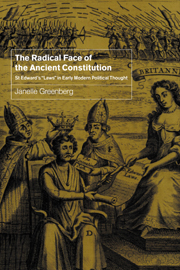Book contents
- Frontmatter
- Contents
- Acknowledgments
- 1 Hagiography and historiography: the long shadow of Edward the Confessor
- 2 “Those most noble and equitable laws of St. Edward”: from the cult of the Confessor to the cult of the Confessor's laws
- 3 “Divers and sundry ancient histories and chronicles”: the articulation of the ancient constitution in the Tudor period
- 4 “By lex terrae is meant the laws of St. Edward the Confessor”: the footprints of the Saxons in the early seventeenth century
- 5 “You shall be king while you rule well”: the radical ancient constitution in the civil wars and interregnum
- 6 “That noble transcript of the original contract, the Confessor's laws”: the radical ancient constitution in the late Stuart period
- Bibliography
- Index
5 - “You shall be king while you rule well”: the radical ancient constitution in the civil wars and interregnum
Published online by Cambridge University Press: 29 August 2009
- Frontmatter
- Contents
- Acknowledgments
- 1 Hagiography and historiography: the long shadow of Edward the Confessor
- 2 “Those most noble and equitable laws of St. Edward”: from the cult of the Confessor to the cult of the Confessor's laws
- 3 “Divers and sundry ancient histories and chronicles”: the articulation of the ancient constitution in the Tudor period
- 4 “By lex terrae is meant the laws of St. Edward the Confessor”: the footprints of the Saxons in the early seventeenth century
- 5 “You shall be king while you rule well”: the radical ancient constitution in the civil wars and interregnum
- 6 “That noble transcript of the original contract, the Confessor's laws”: the radical ancient constitution in the late Stuart period
- Bibliography
- Index
Summary
Ideas unlike events are never unprecedented.
Hannah ArendtINTRODUCTION
The revolutionary potential of St. Edward's laws, the Modus tenendi Parliamentum, and the Mirror of Justices was first fully realized during the period from 1642 to 1660, when rebels of all stripes deployed them to justify rebellion, regicide, and republicanism. Modern scholars, as has already been noted, sometimes suggest that in the civil war period “political rationalism” and natural law theories began to rival ancient constitutionalist argumentation and eventually to supplant it. While it is true that other idioms of political thought appeared in parliamentarian discourse, I suggest in this chapter that the suppleness of the medieval canon has been greatly under-estimated. Not only did St. Edward's laws, the Modus, and the Mirror remain central to dissident theorizing, their value even increased. Indeed, they gave rebels familiar and convincing historical arguments with which to counter the royalists' powerful defense of the king. More particularly, the three sources served as ballast for a new line of anti-royalist argumentation. This was the doctrine of coordination, which the Long Parliament and its supporters fashioned from Charles I's Answer to the XIX Propositions.
To appreciate the critical role of St. Edward's laws, the Modus, and the Mirror, we must first get the lay of the ideological land. By mid-century, two divergent views of political society shaped the political thought of Stuart England.
- Type
- Chapter
- Information
- The Radical Face of the Ancient ConstitutionSt Edward's 'Laws' in Early Modern Political Thought, pp. 182 - 242Publisher: Cambridge University PressPrint publication year: 2001
- 1
- Cited by



